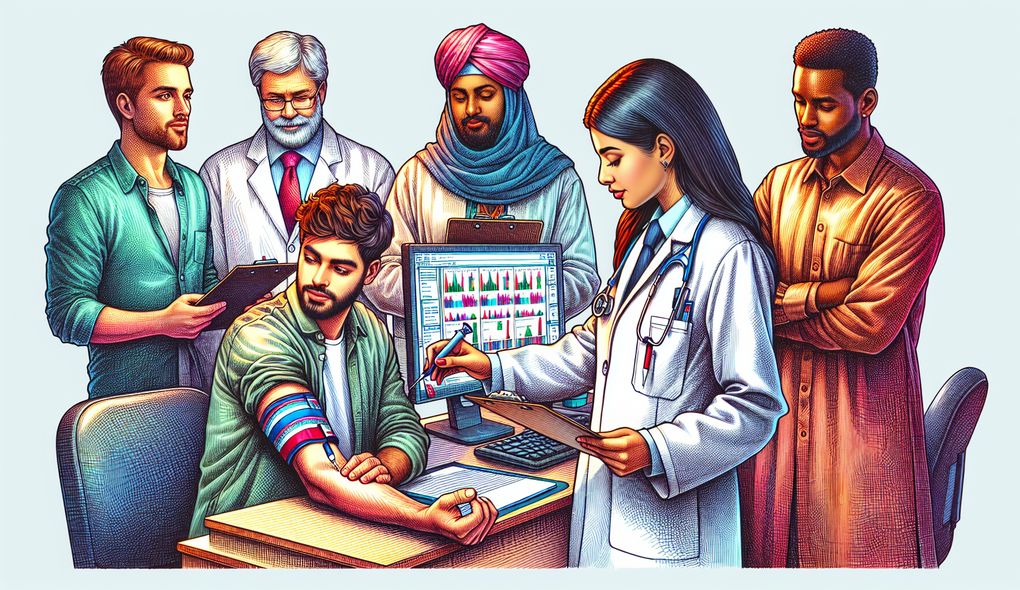How do you ensure accurate documentation and record-keeping during patient visits?
JUNIOR LEVEL

Sample answer to the question:
To ensure accurate documentation and record-keeping during patient visits, I make it a priority to actively listen and pay close attention to details. I take thorough notes during the visits, capturing the patient's medical history, symptoms, and any treatments or medications prescribed. I also use electronic medical record (EMR) systems to input and organize the information in a structured and easily retrievable manner. Additionally, I understand the importance of following regulatory guidelines and protocols, so I double-check my documentation for completeness and accuracy. Finally, I collaborate closely with the clinical research team to address any discrepancies or clarify any unclear information.
Here is a more solid answer:
Ensuring accurate documentation and record-keeping during patient visits is crucial for maintaining the integrity of clinical trial data. To achieve this, I employ a systematic approach that includes several key steps. First, I carefully review the research protocols and informed consent forms to familiarize myself with the requirements and ensure adherence. During patient visits, I actively engage with the patients, asking relevant questions and attentively listening to their responses. I diligently document their medical history, symptoms, and any treatments or medications prescribed. I leverage clinical trial management systems, such as [specific system name], to input and organize the information in a structured and easily retrievable manner. Throughout the process, I maintain a high level of attention to detail, taking the time to double-check my documentation for completeness and accuracy. In cases where there are discrepancies or unclear information, I proactively collaborate with the clinical research team to address and resolve them promptly. Lastly, I am proficient in using the Microsoft Office Suite, allowing me to generate comprehensive reports and presentations for stakeholder updates, as well as ensuring the availability and accuracy of study supplies by keeping track of inventory.
Why is this a more solid answer?
The solid answer is an improvement over the basic answer because it provides more specific details and examples. It demonstrates the candidate's understanding of the importance of adhering to research protocols and informed consent forms, as well as their proficiency in using clinical trial management systems and the Microsoft Office Suite. However, it could further improve by including an example of how the candidate has effectively resolved discrepancies or unclear information through collaboration with the clinical research team.
An example of a exceptional answer:
Accurate documentation and record-keeping during patient visits is a top priority for me, as it ensures the reliability and validity of clinical trial data. To achieve this, I have developed a comprehensive process that encompasses various steps and strategies. Firstly, I immerse myself in the research protocols and informed consent forms to fully comprehend the requirements and expectations. During patient visits, I establish a strong rapport with the participants, creating an open and comfortable environment for communication. I employ active listening techniques and use a combination of paper-based and electronic documentation methods. For instance, I capture critical information using structured electronic data capture (EDC) systems, such as [specific system name], which allows for real-time validation and minimizes data entry errors. To enhance accuracy, I conduct regular quality checks, reviewing the documentation for completeness, consistency, and compliance with regulatory guidelines and Good Clinical Practices. Moreover, I engage in ongoing communication with the clinical research team, promptly addressing any discrepancies or uncertainties. As an example, I recall a recent incident where there was conflicting information regarding a patient's medication history. I collaborated with the principal investigator and conducted a thorough review of the patient's medical records, ultimately resolving the discrepancy and ensuring accurate documentation. Additionally, I leverage my proficiency in Microsoft Office Suite to generate comprehensive reports and presentations, ensuring effective communication with stakeholders. To facilitate inventory management, I maintain meticulous records of study supplies, tracking their availability and expiration dates. Overall, my meticulous approach, attention to detail, and effective communication skills contribute to accurate documentation and record-keeping in patient visits.
Why is this an exceptional answer?
The exceptional answer provides a comprehensive response that goes above and beyond the solid answer. It includes specific examples and demonstrates the candidate's expertise and proficiency in accurate documentation and record-keeping during patient visits. The candidate showcases their knowledge of research protocols, informed consent forms, regulatory guidelines, and Good Clinical Practices. They also highlight their use of electronic data capture systems, their ability to address and resolve discrepancies, and their proficiency in the Microsoft Office Suite. Furthermore, the candidate illustrates their attention to detail and effective communication skills through an example of resolving conflicting medication history information. However, the answer could be further improved by incorporating additional examples to demonstrate the candidate's ability to multitask and manage multiple responsibilities concurrently, as stated in the job description.
How to prepare for this question:
- Review and familiarize yourself with the research protocols and informed consent forms to understand the requirements and expectations.
- Practice active listening techniques to improve your communication skills during patient visits.
- Become proficient in using clinical trial management systems, such as [specific system name], to ensure accurate and organized documentation.
- Ensure your knowledge of regulatory guidelines, Good Clinical Practices, and clinical terminology is up to date.
- Develop strong attention to detail by consistently reviewing and double-checking your documentation for completeness and accuracy.
- Sharpen your proficiency in the Microsoft Office Suite, particularly in generating reports and presentations.
- Seek opportunities to collaborate and communicate effectively with the clinical research team to address discrepancies and uncertainties.
- Practice multitasking and managing multiple responsibilities concurrently to demonstrate your ability to meet the job requirements.
What are interviewers evaluating with this question?
- Organizational Skills
- Attention to Detail
- Compliance with Protocols
- Communication Skills

